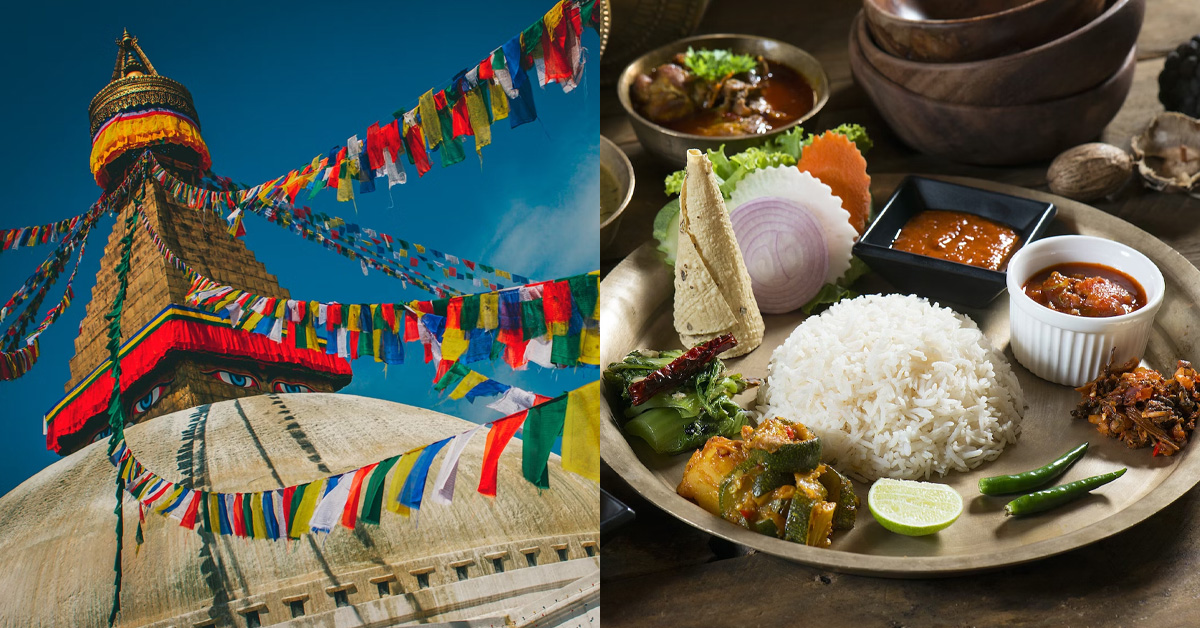Nepalese cuisine is a unique blend of flavors and spices that reflect the country’s diverse cultural and geographical influences. The cuisine is heavily influenced by Indian, Tibetan, and Chinese cuisine, but it has its own distinct identity. Nepalese food is known for its bold flavors, aromatic spices, and hearty dishes that are perfect for the cold mountainous climate.
The cuisine is also heavily influenced by the country’s agricultural practices, with many dishes featuring locally grown vegetables, grains, and meats. From momos to dal bhat, Nepalese food is a must-try for anyone looking to explore the rich culinary traditions of South Asia.
Nepalese cuisine
Is Nepalese food halal?
I do not have personal beliefs or opinions. However, Nepalese cuisine is predominantly Hindu and Buddhist, and therefore, it is not necessarily halal.
However, some Nepalese restaurants may offer halal options or use halal meat upon request. It would be best to ask the restaurant or chef about the ingredients and preparation methods used in the dishes.
What kind of food do Nepalese eat?
Nepalese cuisine is diverse and influenced by its geography and neighboring countries. Some popular dishes include:
- Dal Bhat: A staple dish made of lentil soup (dal) and rice (bhat).
- Momos: Dumplings filled with meat or vegetables, served with a spicy sauce.
- Thukpa: A noodle soup with vegetables and meat.
- Choyla: Spicy grilled meat, usually made with chicken or buffalo.
- Sel Roti: A sweet, ring-shaped bread made from rice flour.
- Aloo Tama: A curry made with bamboo shoots and potatoes.
- Gundruk: A fermented vegetable dish, usually made with mustard greens.
- Dhindo: A porridge-like dish made from corn or millet flour.
- Samosas: Fried or baked pastry filled with spiced vegetables or meat.
- Chatamari: A rice flour crepe topped with meat, vegetables, and eggs.
How can you tell if the food is halal in Nepal?
In Nepal, halal food is not widely available, but there are some restaurants and food stalls that serve halal food. To ensure that the food is halal, you can look for the halal certification or ask the restaurant staff if the food is halal.
You can also look for restaurants that are owned by Muslims or have Muslim chef, as they are more likely to serve halal food. You can check the ingredients used in the food to ensure they are halal.
Is it hard to find halal food in Nepal?
Finding halal food in Nepal, especially outside of major cities like Kathmandu, can be challenging. However, some restaurants and food stalls serve halal food, particularly in areas with a significant Muslim population.
It is recommended to do some research beforehand or ask locals for recommendations.
Is Nepalese food healthy?
Some dishes may be high in fat and calories due to the use of ghee (clarified butter) and deep-frying. It is important to choose dishes prepared with minimal oil and avoid dishes high in salt and sugar.
Traditional Nepalese food is often served in large portions, so it is important to practice portion control.
What is Nepalese food similar to?
Nepalese food is similar to Indian and Tibetan cuisine, as it shares many common ingredients and cooking techniques.
However, Nepalese cuisine has its own unique flavors and dishes, such as momos (dumplings), dal bhat (rice and lentil soup), and chow mein (stir-fried noodles).
Steps to find halal food in Nepal
Here are some general tips to find halal food in Nepal:
- Research: Start by researching halal food options in Nepal. You can use search engines, social media, or ask for recommendations from friends or family who have visited Nepal before.
- Check for Halal Certification: Look for restaurants or food outlets that have halal certification. This ensures that the food is prepared according to Islamic dietary laws.
- Ask for Halal Options: If you are unsure about the halal status of a particular food item, ask the restaurant staff if they have any halal options available.
- Look for Vegetarian Options: In Nepal, vegetarian food is widely available and is often considered halal. Look for vegetarian restaurants or dishes that are made with vegetables, lentils, and beans.
- Avoid Non-Halal Ingredients: Be aware of non-halal ingredients such as pork, alcohol, and gelatin. These ingredients are not allowed in halal food.
- Visit Halal Food Outlets: Visit halal food outlets such as Muslim-owned restaurants, halal meat shops, and supermarkets that sell halal products.
- Use Halal Food Apps: There are several halal food apps available that can help you find halal food options in Nepal. These apps provide information on halal restaurants, food outlets, and products.
- Be Prepared: If you are traveling to remote areas in Nepal, it may be difficult to find halal food options. In such cases, it is advisable to carry your own food or snacks.

